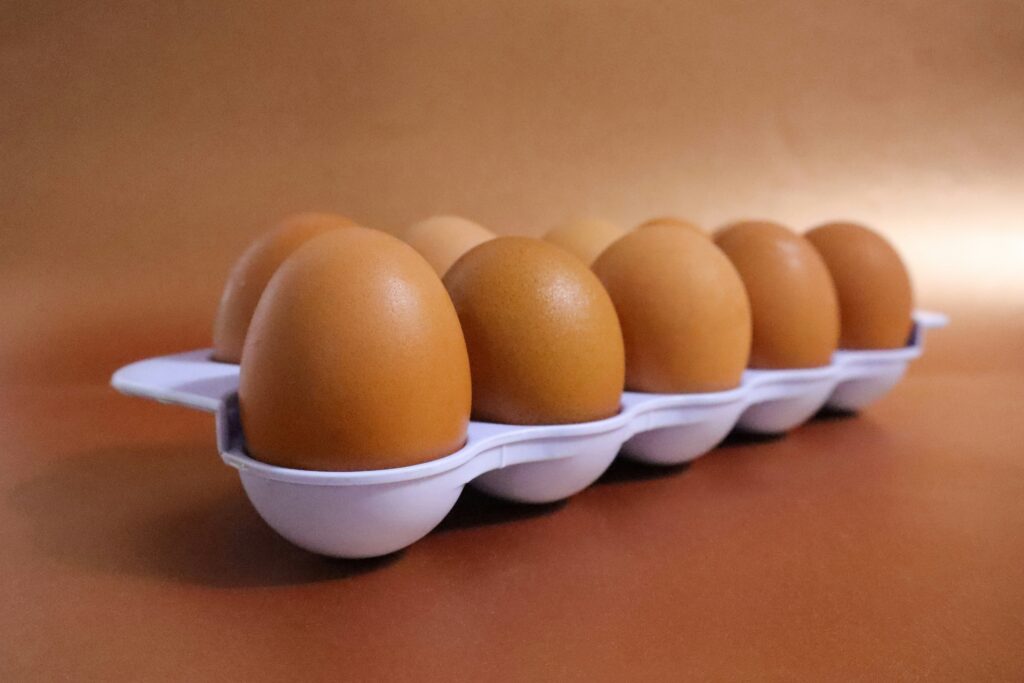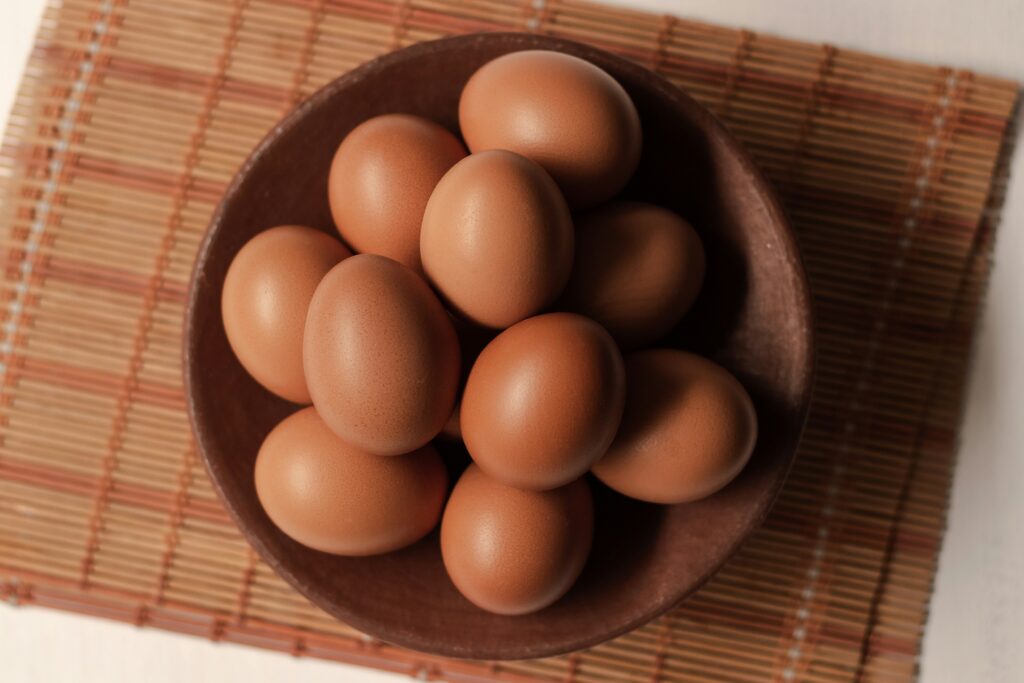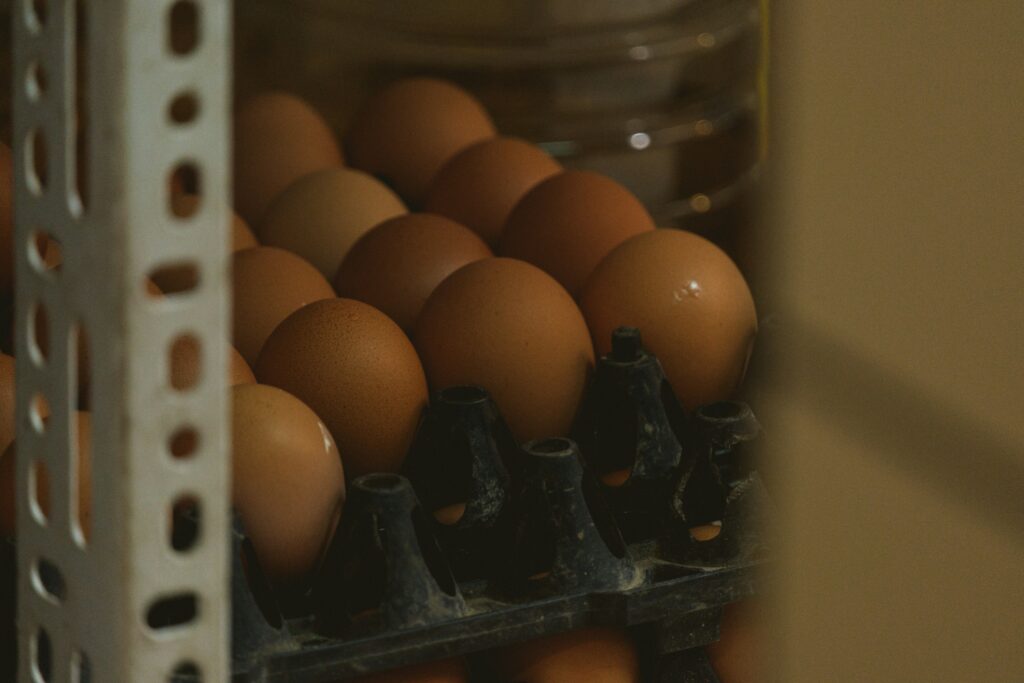Introduction: Understanding Egg Freshness
When it comes to egg storage, there’s often confusion—especially between countries like the U.S. and those in Europe. But the core concern is this: How long do eggs last out of the fridge? The answer isn’t as straightforward as you might think, and depends on several factors such as processing, cleanliness, temperature, and the presence of the egg’s natural protective layer.
Let’s crack open the facts and get clarity on egg freshness and storage.

Photo by Jorge Campos on Unsplash
The Science of Egg Spoilage
Eggs are porous. That means air and bacteria can pass through the shell over time. Spoilage occurs when harmful bacteria, like Salmonella, invade and multiply. But spoilage also happens due to natural degradation—loss of moisture, thinning of egg whites, and development of off-smells or discoloration.
Key Spoilage Factors:
- Temperature fluctuations
- Exposure to air and contaminants
- Removal of the cuticle or “bloom”
- Humidity and storage environment
Room Temperature vs. Refrigeration: What’s the Difference?
USDA vs. European Egg Storage Practices
In the U.S., eggs are washed and sanitized before sale, which strips away the bloom (the natural protective layer). This is why American eggs must be refrigerated immediately—removing the bloom leaves the eggs vulnerable to bacteria.
In contrast, European countries often do not wash eggs, preserving the bloom. This allows for safe room temperature storage for up to 3 weeks—a practice backed by the European Food Safety Authority.
Which Method Keeps Eggs Safer?
According to the USDA and CDC guidelines, once eggs are refrigerated, they must stay refrigerated. Constant chilling prevents bacteria from multiplying.
How Long Can Eggs Sit Out? (The Real Answer)
The keyword here is: it depends.
Unwashed Farm Fresh Eggs
- Can last 2 to 3 weeks at room temperature.
- The bloom acts as a natural barrier against bacteria and moisture loss.
- Store in a cool, dark spot (ideally below 68°F or 20°C).
Washed Commercial Eggs
- Should not sit out for more than 2 hours (especially in warm climates).
- Without refrigeration, bacteria like Salmonella can double every 20 minutes.
- After 2 hours, toss or cook immediately.
| Egg Type | Room Temp Shelf Life | Fridge Shelf Life |
| Unwashed (Farm Fresh) | 2-3 weeks | 3 months |
| Washed (Store Bought) | 2 hours | 3-5 weeks |

Photo by Laize de Souza on Unsplash
The Role of the Bloom in Egg Preservation
The bloom, or cuticle, is a thin protective coating that seals the pores of the eggshell. This natural barrier:
- Keeps out bacteria
- Locks in moisture
- Preserves freshness
Washing eggs removes this bloom, which is why fresh-from-the-farm eggs can survive without refrigeration—while store-bought ones cannot.
Recognizing Spoiled Eggs
The Float Test
A simple way to test egg freshness:
- Sink = fresh
- Tilted = older, but usable
- Float = bad
As eggs age, air builds inside the shell, making them buoyant.
Visual and Smell Indicators
- Spoiled eggs often have:
- Chalky or slimy shells
- Sulfur-like smell
- Cloudy whites or pink/yellow tints
- Chalky or slimy shells
When in doubt, throw it out.
Safe Handling Tips for Eggs
Before Use
- Wash hands after handling raw eggs.
- Keep eggs in their original carton.
- Don’t store in the fridge door—too much temperature fluctuation.
During Cooking
- Cook until whites and yolks are firm.
- Dishes with eggs should hit at least 160°F (71°C) internally.
Best Practices for Storing Eggs Without Refrigeration
If refrigeration isn’t an option (e.g., camping or rural living):
- Choose unwashed eggs only.
- Store below 70°F (21°C) in a dry, shaded place.
- Use egg storage trays or ceramic holders.
- Turn eggs daily to prevent yolk from settling.
Can You Still Eat Eggs Left Out Overnight?
If the eggs are unwashed and farm-fresh: Yes, as long as the room isn’t too warm.
If the eggs are store-bought and washed: No. Discard them. Bacteria may have multiplied beyond the safe limit.
Travel & Camping: Keeping Eggs Safe Outdoors
Storage Containers and Cooling Techniques
- Use insulated coolers with ice packs
- Store eggs in dry places, away from direct sunlight
- For longer trips, consider dehydrated or powdered eggs

Photo by Olga Kudriavtseva on Unsplash
Are Raw or Cooked Eggs Safer Outside the Fridge?
Cooked eggs spoil faster than raw ones. Always refrigerate cooked eggs within 2 hours.
| Egg State | Safe Out Time |
| Raw (unwashed) | 2-3 weeks |
| Raw (washed) | 2 hours |
| Cooked | 2 hours |
Do Egg Types (Chicken, Duck, Quail) Impact Shelf Life?
Yes.
- Duck eggs have thicker shells, slightly longer shelf life.
- Quail eggs are more delicate—shorter room temp storage.
- Chicken eggs are most commonly studied and follow the standard timelines listed above.
Myth-Busting: Common Misconceptions About Egg Safety
- “A floating egg is always bad.”
→ Not always. Older? Yes. Unsafe? Not necessarily. - “All eggs need refrigeration.”
→ Only if washed. The bloom changes everything. - “Raw eggs are more dangerous than cooked ones.”
→ Depends on source and handling. Undercooked eggs from unsafe sources are high risk.
FAQs About Storing Eggs at Room Temperature
1. Can I leave store-bought eggs out overnight?
No. U.S. eggs are washed and need refrigeration. Discard if left out more than 2 hours.
2. How long can unwashed eggs sit out?
Up to 3 weeks if kept in a cool, dry place below 70°F.
3. Do farm eggs need to be washed?
No. Avoid washing until right before use to preserve the bloom.
4. Is it safe to eat an egg that floats?
Maybe. Floaters are old. Crack and smell-check before using.
5. What’s the best way to store eggs without a fridge?
Keep unwashed eggs in an egg carton in a dark, cool area. Turn them daily.
6. What temperature is too warm for egg storage?
Above 70°F (21°C) increases spoilage risk, especially for longer periods.

Photo by Nguyễn Hiệp on Unsplash
Conclusion: Keeping Your Eggs Fresh and Safe
Egg freshness doesn’t come down to luck—it’s science and safe practice. Whether you buy your eggs from the grocery store or the farmer down the road, understanding how long they last outside the fridge is key to food safety and minimizing waste.
Always consider the type of egg, how it’s processed, and where you store it. When in doubt? Do the float test, check the smell, and remember: safe storage equals safer meals.
